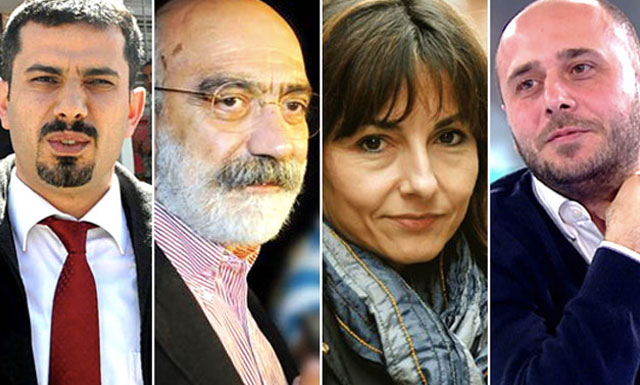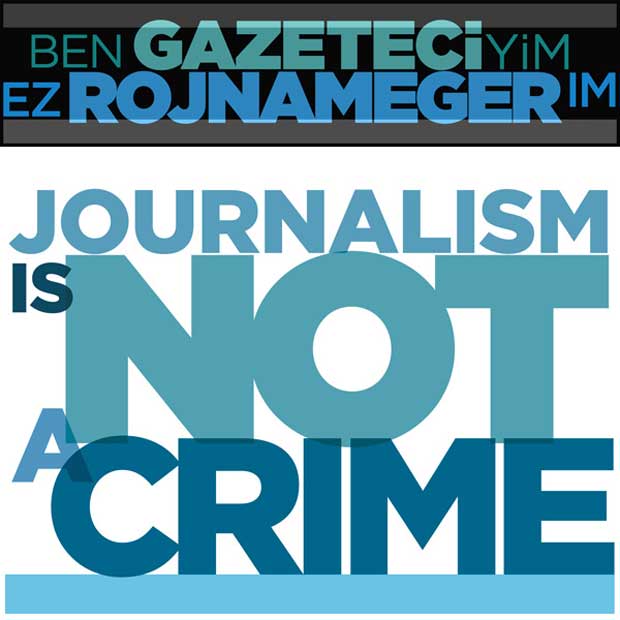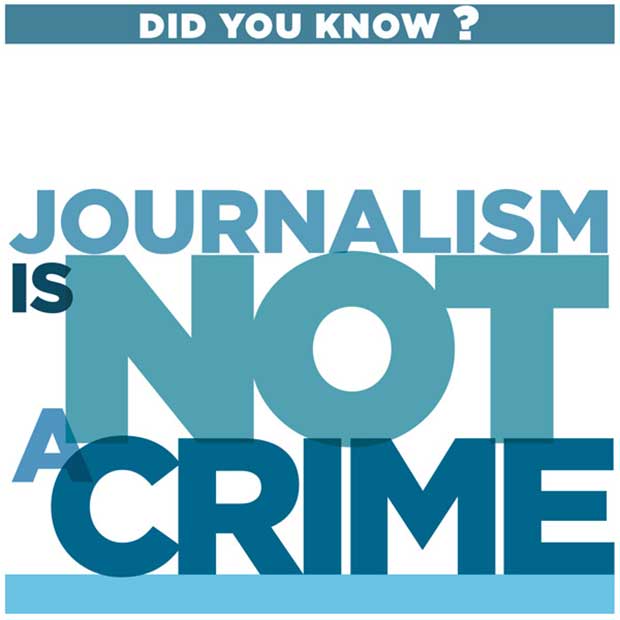15 Jul 2016 | Campaigns, Campaigns -- Featured, Mapping Media Freedom, Turkey, Turkey Statements
Index on Censorship is delighted to be one of the nine groups honoured by the Turkish Journalists Association (TGC) with this year’s Press Freedom Prize.
TGC announced on Wednesday that it was awarding a coalition of international press freedom organisations with the award “for the unique solidarity unparalleled in the past, it showed against the assaults on press freedom in Turkey, for its efforts to bring to international platforms the violation of rights and for instilling in their Turkish colleagues the feeling that they are not alone.”
The organisations – Reporters Without Frontiers, Committee for the Protection of Journalists, International PEN, International Press Institute, Index on Censorship, International Federation of Journalists, European Federation of Journalists, Ethical Journalism Network, Article 19 and World Association of Newspapers and News Publishers – have worked together in a number of ways to bring attention to the increasing attacks on media freedom by the Turkish government.
This includes press freedom monitoring and advocacy missions, petitions and joint statements to governmental and international bodies in an effort to highlight the dangerous environment in which journalists now operate.
“This is a great honour,” said Index senior advocacy officer Melody Patry, who took part in the coalition’s emergency press freedom mission last October. “Members of the press in Turkey are facing relentless attacks and for the coalition to receive this prize sends a strong message that international solidarity is crucial to supporting media freedom in the country.”
Press freedom in Turkey has declined particularly rapidly in the last six months. Some 70 incidents have been recorded on Index’s Mapping Media Freedom database since the beginning of the year, including the death of three journalists and 34 incidents of arrest and detention.
Turkey Uncensored:
Charges against five journalists must be dropped
A loud disagreement finds a common ground: Journalism is not a crime
Standing in solidarity with Turkey’s journalists
Can Dündar: Turkey is “the biggest prison for journalists in the world”
14 Jul 2016 | Campaigns, Campaigns -- Featured, Statements, Turkey, Turkey Statements

(Photos: Pen International)
Charges of acquiring and divulging state secrets, membership of, and administration of a terrorist organisation brought against five journalists, including four former members of Taraf newspaper’s editorial and investigative staff, must be dropped and one of the accused, Mehmet Baransu, must be released immediately and unconditionally, PEN International, English PEN, German PEN, Swedish PEN, PEN America, ARTICLE 19, the Committee to Protect Journalists, the European Federation of Journalists, the Ethical Journalism Network, IFEX, Index on Censorship, the International Federation of Journalists, Global Editors Network and Reporters Without Borders said in a joint statement today.
‘These charges are a clear infringement of the right to free expression and a free press in Turkey and must be dropped, and Baransu released. It’s yet another example of abuses by the Turkish authorities of the problematic Anti-Terror law to silence investigative journalists. The law must be reformed without delay,‘ said Carles Torner, Executive Director of PEN International.
The charges concern Taraf editor, Ahmet Altan; deputy editor, Yasemin Çongar; Taraf journalists Mehmet Baransu, Yıldıray Oğur and, a fifth journalist, Tuncay Opçin. All five journalists are facing charges of acquiring and divulging documents concerning the security of the state and its political interests punishable by up to 50 years in prison. Mehmet Baransu and Tuncay Opçin are facing additional charges of ‘membership and administration of a terrorist organization’ and face a possible 75-year prison term.
The charges are detailed in a 276 page indictment, which was accepted on 20 June 2016 by the Istanbul High Criminal Court, 16 months after the initiation of the investigation. Baransu has been held in pre-trial detention since his arrest on 2 March 2015. The journalists’ next hearing is due to be held on 2 September 2016.
The indictments and the materials presented by the prosecutor in relation to the case are open to very serious doubts, suggesting that the charges are politically motivated.
While large parts of the indictment against the journalists focuses on a series of controversial news reports, titled the ‘Balyoz (Sledgehammer) Coup Plan’[1], published in Taraf between 20-29 January 2010, about an alleged military coup to overthrow the Justice and Development Party (AK Party) government, the charges do not, in fact, relate to this story. Indeed, the indictment does not suggest Taraf’s decision to publish the Balyoz papers was criminal and Balyoz does not figure in the specific charges presented at all.
Instead, the indictment brings charges of acquiring and divulging state secrets against the five journalists concerning the ‘Egemen Operation’ plan – an out of date military war plan to respond to a Greek invasion. However Taraf did not publish state secrets regarding this operation, as a prior judgment of the Turkish Constitutional Court affirms.
‘Beyond the simple problem of a lack of evidence, there are serious concerns regarding the indictment which suggest it has been written to obfuscate facts and to implicate the journalists in involvement in the Balyoz case, an already controversial story, to limit public support for their situation,’ said Erol Önderoğlu from Reporters Without Borders (RSF).
Additionally, 46 pages of the indictment prepared against the former Taraf journalists have been copied directly from the indictment against Cumhuriyet journalists, Can Dündar and Erdem Gül, who exposed illegal arms transfers by the Turkish Intelligence Service (MIT) into Syria and were sentenced to prison for five years for this crime. The degree of direct reproduction is evident from the fact that one paragraph of the indictment even starts with the words “The Defendant Can Dündar.”
‘The fact that large parts of the indictment have been copied from another high profile case targeting journalists raises significant concerns about the motivation and professionalism of the Prosecutor: not only does this call into question the extent to which the facts and evidence of the case have been properly examined, it reinforces concerns that the charges may be politically motivated’ said Katie Morris, Head of the Europe and Central Asia Programme at Article 19.
PEN International, English PEN, German PEN, Swedish PEN, PEN America, ARTICLE 19, the Committee to Protect Journalists, the European Federation of Journalists, the Ethical Journalism Network, IFEX, Index on Censorship, the International Federation of Journalists, Global Editors Network and Reporters Without Borders call on the Turkish authorities to immediately and unconditionally release Baransu and to drop all charges that the five journalists face as a result of their work in public interest. Such legal actions against journalists, result in a pervasive ‘’chilling-effect’’ among the rest of the media in the country, which is compounded where fundamental fair trial safeguards are not upheld.
________
[1] These reports were based on a series of classified documents and CDs acquired from an anonymous source. They led to widespread discussion in the country, which prompted Turkish prosecutors to initiate a controversial trial against the alleged coup-plotters named in the documents. The army officers implicated in the alleged coup plot revealed by Taraf have repeatedly claimed that the evidence against them was fabricated. In 2014, Turkey’s highest court ruled that the authorities had violated the officers’ right to a fair trial, leading to fresh hearings and mass releases from prison; including releases for several officers that had previously received sentences of up to 20 years in prison.
13 Jul 2016 | mobile, News, Turkey, Turkey Uncensored

The above was part of a series of tweets were sent out by Platform for Independent Journalism (P24) near midnight on 11 July. P24 joined editors, reporters, columnists, bloggers and civil society activists, who are, despite being a minority in the shackled media sector in Turkey, determined to defend the honour of our noble profession till the very end.
The “Journalism is not a crime” logo is now in circulation in Turkish, Kurdish, English and a variety of other languages. The hope is that this slogan will trigger widespread domestic and international solidarity to rescue Turkey’s journalism from being turned into a total wreck.
On Tuesday morning, I watched three of the figures behind the campaign on TV. It is a rarity, these days, that any voice in defence of freedoms and rights find a public space on Turkey’s TV stations. It filled me with a sense of pride, hope and courage, but was tinged with a slight sense of despair.
That any so-called private mainstream TV channel would invite them on to share their views is a daredevil act, because these newsrooms are practically run by the same proprietors and their puppet editors, whose variety of businesses are strictly dependent on the public contracts, and any challenge to the AKP government would mean severe punishment. This is the impact self-censorship, in addition to direct censorship, has had on public debate as well as free reporting in roughly 90% of the Turkish media.
The appearance of Fehim Işık, a Kurdish columnist, Said Sefa, owner of the independent news site Haberdar, and Arzu Demir, a leading figure in the Turkish Journalists’ Union on the tiny Can Erzincan TV took place with an air of gloom. One of the three or four channels still willing to broadcast critical and diverse content, this channel will be dropped fromTurksat satellite by 20 July, on the back of a murky decision by the satellite board over claims it spreads terrorist propaganda.
Experienced lawyers are flabbergasted once more by the lawlessness reigning over the media domain, but there is little they can do about it. A month or so ago, another TV channel, IMC TV, met the same fate and was forced to switch to a different satellite service, losing more than 75% of its mainly Kurdish audience. Can Erzincan TV, a financially strapped and tiny liberal outlet, will also lose viewers. This is a cunning form of censorship by the authorities.
With Can Erzincan TV pushed out of the limelight, Turkish viewers will be left only with Halk TV and FoxTV, both of which are also in the crosshairs for further punitive actions.
When – rather than if – they also are gone, the AKP will have a free ride on the most powerful, efficient medium in journalism. Remnant portions of dignified journalists, regardless of their political colour, will have to retreat into a handful newspapers and news sites.
This is the bad news.
The good news is that, as I expected, the very core of real journalism in Turkey is intent on professional resistance to further erosion. The current initiative #Iamajournalist is yet another amazing attempt to rise up. I watched it develop spontaneously as a social media movement, which rapidly turned into a community action.
The very good news is that it now contains elements which find common cause between the liberals, leftists, Kurds, seculars, and concerned conservatives: protecting journalism as the main pillar of democracy. This is unfinished business in Turkey, and something the country’s “dark forces” want to reverse in full.
For a week starting from July 11, a handful of newspapers, websites and TV channels will display the “Journalism is not a crime” logo. Social media, too, is busy.
“Protecting freedom of press also means defending the public’s right of access to information. In a society where the right to information is restricted, one cannot speak of democracy,” they say.
“As journalists we will do everything within our power to be the voice of those who have been marginalised, imprisoned, and silenced for doing their jobs and defending the freedom of press and freedom of access to information for all of us.”
We must now keep in our minds the 44 journalists in Turkish jails. It’s a grim number that will rise. There are thousands of journalists who are forced to operate in newsrooms resembling labor camps, or — to use a term I used in my Harvard paper a year and a half ago – “open-air prisons”, subordinated to spread propaganda, lies and hate speech.
This spontaneous initiative, which grew without the involvement of some polarised journalist organisations, needs attention, and support. Journalists in Turkey are tough nuts, but the conditions are swiftly hardening. We need to keep the spirit of journalism alive.

Turkey Uncensored is an Index on Censorship project to publish a series of articles from censored Turkish writers, artists and translators.
11 Jul 2016 | Campaigns, Campaigns -- Featured, mobile, Statements, Turkey, Turkey Statements

Index on Censorship supports the “I am a journalist” campaign launched by journalists and media freedom advocates from Turkey.
We stand in solidarity with our colleagues in Turkey who fiercely continue their jobs despite facing relentless attacks and attempts to silence them. We also express our support to the 44 journalists and news distributors in jail, and to those facing arrest as retaliation for exercising their right to freedom of expression and freedom to inform.
Here is the campaign statement:
I am a journalist!
Journalism is not a crime.
In Turkey, harassment of the press is getting worse by the day.
Those who are struggling to protect media freedom and do their jobs are forced to pay a heavy price.
Journalists reporting from conflict zones are subjected to constant threats, putting their lives in danger.
Reporters, editors and writers often face criminal investigations, and can be prosecuted for defamation. Many of them are held in custody awaiting trial or are imprisoned because of their reports or posts on social media.
Journalists are easily labeled as enemies of the state, traitors or spies, and are prosecuted on such charges as “spreading propaganda of terrorist organisations”.
Foreign journalists who live and report from Turkey have not been immune to these allegations. Journalism has come under attack during different periods of Turkish history but members of the international press have never been targeted on this scale.
Journalists in the mainstream media are forced to work in such conditions that they cannot do their jobs properly anymore, and can be easily fired if they question the official government line. Heavy censorship is the norm and critical voices are constantly stigmatised.
The facts are restricted by frequent media blackouts. Those the challenge the blackouts are usually labelled as traitors, or even as terrorists, and presented as criminals. Various independent media outlets are under permanent threat of being shut down.
People from different sectors of society who show solidarity with journalists to defend press freedom, as well as the right to information, have also become targets of investigation and prosecution.
However, these pressures have not stopped a group of journalists from traveling to Diyarbakır from the western cities of Istanbul, Ankara and Izmir this year to show solidarity with their colleagues who work under immense pressure in conflict zones. They stand together in front of prisons, the courthouses and at news desks.
Protecting freedom of press also means defending the public’s right of access to information.
In a society where the right to information is restricted, one cannot speak of democracy.
Therefore, as journalists we will do everything within our power to be the voice of those who have been marginalised, imprisoned, and silenced for doing their jobs and defending the freedom of press and freedom of access to information for all.
As journalists from Turkey, we cry out once again:
Journalism is not a crime!




